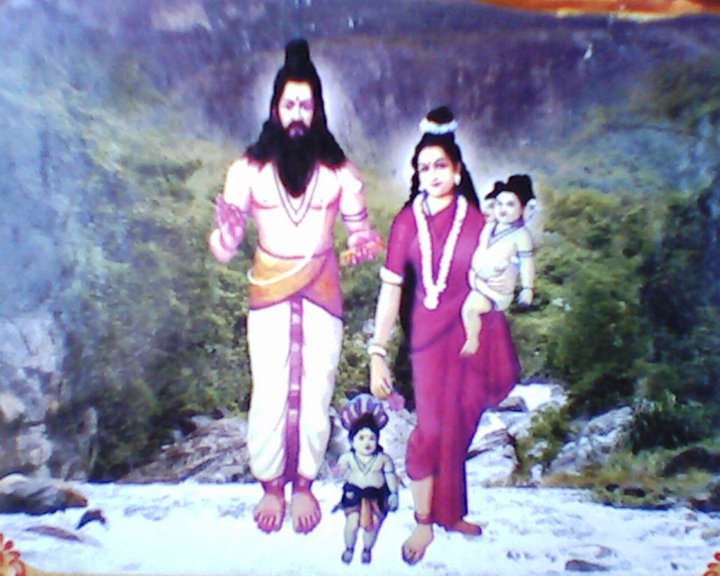Atri
Atri (Sanskrit: अत्रि) is a Vedic sage, who is credited with composing a large number of hymns to Agni, Indra and other Vedic deities. Atri is one of the Saptarishis (seven great Vedic sages) in the Hindu tradition, and the one most mentioned in its scripture Rigveda. The fifth Mandala (Book 5) of Rigveda is called the Atri Mandala in his honour, and the eighty seven hymns in it are attributed to him and his descendants. Atri is also mentioned in the Puranas and the Epics such as the Ramayana and the Mahabharata.
Atri was married to Anasuya. They had three sons, Dattatreya, Durvasas and Soma. Atri is the last among the mind-born sons of Brahma and is believed to have originated from Brahma's the tongue. When instructed by divine voice to do penance, Atri readily agreed and did severe penance. Pleased by his devotion and prayers, Brahma, Vishnu and Shiva appeared before him and offered him boons. He sought all the three to be born to him. Anusuya, by the powers of her chastity, rescued the three gods and in return, they were born as children to her. Brahma was born to her as Soma or Chandra, Vishnu as Dattatreya and Shiva in some part as Durvasa.
In the Ramayana, Rama, Sita and Lakshmana visit Atri and Anasuya in their hermitage. Atri's hut is described to be in Chitrakuta, near a lake with divine music and songs, the water loaded with flowers, green water leaves, with many "cranes, fisher birds, floating tortoises, swans, frogs and pink geese".
He is the seer of the fifth Mandala (Book 5) of the Rigveda. Atri had many sons and disciples who have also contributed in the compilation of the Rig Veda and other Vedic texts. Mandala 5 comprises 87 hymns, mainly to Agni and Indra, but also to the Visvedevas ("all the gods'), the Maruts, the twin-deity Mitra-Varuna and the Ashvins. Two hymns each are dedicated to Ushas (the dawn) and to Savitr. Most hymns in this book are attributed to the Atri clan composers, called the Atreyas. These hymns of Rigveda was composed in the north-western region of the Indian subcontinent, most likely between c. 1500–1200 BCE.
The Atri hymns of the Rigveda are significant for their melodic structure as well as for featuring spiritual ideas in the form of riddles. These hymns include lexical, syntactic, morphological and verb play utilizing the flexibility of the Sanskrit language. The hymn 5.44 of the Rigveda in Atri Mandala is considered by scholars such as Geldner to be the most difficult riddle hymn in all of the Rigveda. The verses are also known for their elegant presentation of natural phenomenon through metaphors, such as poetically presenting dawn as a cheerful woman in hymn 5.80.
While the fifth mandala is attributed to Atri and his associates, sage Atri is mentioned or credited with numerous other verses of the Rigveda in other Mandalas, such as 10.137.4.
